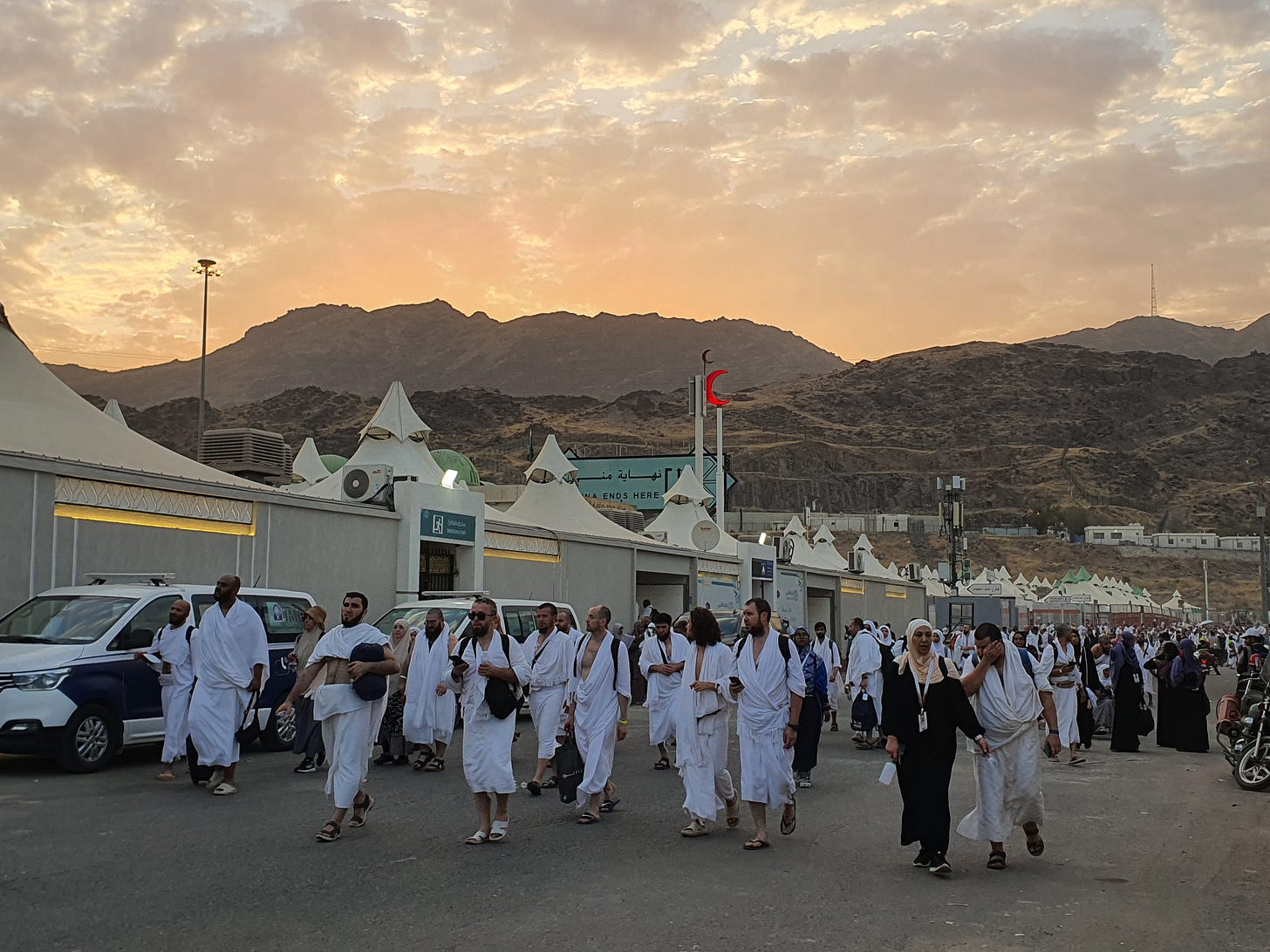
Last night I got an email from a friend asking me how my Hajj went, and it was a good spur for me to write this newsletter.
Yes, I’m alive, and I finished the obligatory Hajj rituals, which makes me a “Hajja” in Muslim terms. (I’m happy if people address me by that honorific but it’s certainly not something I’ll insist on!) And while most of the changes wrought during a Hajj are at the spiritual level, within the knowledge of Allah SWT and not mine, I’ve observed some minute changes since I’ve been home. Alhamdulillah.
There were surprises, both hardships and delights. Let’s take the hardships first.
Hajj is physically difficult. Who knew?
The world’s biggest slumber party, minus the slumber: the plain of Muzdalifah on the night of 10 Dhul Hijjah. (I did actually sleep a little bit!)
How about that heat?
You may have heard of the deaths of 500-odd people at Hajj this year. The heat during the final week of my stay was in fact overwhelming, 50 Celsius during the day.
I’m one of the people who came down with heatstroke in Mina camp the same day a lot of people died. The guides representing my travel agency had to lug me out of the shared room in white sheets, which in Islam is how you wrap a dead body… and I was told people were absolutely freaking out.
They took me over to the clinic a few steps away from my camp room to be treated. I was conscious throughout, and I will say this: early on in my treatment, as I have heard recommended by many, I started saying the shahada (the Muslim profession of faith) in the event I did in fact die. (I count this as good preparation should I be conscious when death does come to me.) But it wasn’t my time.
After I felt a little better from heatstroke, I knew I couldn’t stay at Mina. The heat was such that the air conditioning in the camp room, while adequate for most purposes, could not keep it at bay. Plus, I wasn’t sleeping, and I knew there was something else going on with my body (although I didn’t know yet what it was). I asked my guides to bring me back to the well-cooled hotel room in Makkah city, and they kindly obliged.
Before returning to the hotel, I first went back to my camp room to collect some of my things, with much assistance from several of the women I roomed with. When I entered the room, I was greeted with song and literal ululation from the lovely Moroccan, Tunisian, and Algerian women who made up my group. It was VERY moving and I was humbled. (I did not take pictures of people in my group for the most part; it felt like an invasion of privacy. But see the sections below for pix and video of some of the 2 million-plus people who made Hajj this year.)
The microbes found me, and Muslim hospitality helped restore me.
As I mentioned above, I knew something more was off about my body on the day of the heatstroke. I even visited a hospital the night I got back to the hotel, but of course at that point I didn’t feel that bad anymore, and my O2 level and body temp were within normal range. (The normal O2 level is critical to mention here, since it was not what we should have seen.)
But I felt increasingly draggy after that day, and I had a pain in the center of my abdomen just below the solar plexus that I thought signaled gall bladder or pancreas problems. I had shortness of breath too, but it didn’t register with my brain as significant. (Wrong.)
The last two obligatory rituals of Hajj, tawaf and sa’ee, require a few kilometers of walking. I knew I couldn’t do all that walking, so I had to do them in a wheelchair, which was costly but worth it. (And it’s actually a nice way to experience those rituals if you can’t walk.) Not being able to walk any distance was worrying, to say the least. But I knew I was leaving for home in a couple days, so I simply held out.
Upon my arrival in Madrid, I asked the friend who picked me up to take me right over to the hospital. Guess what: nothing I was experiencing had to do with my gallbladder or pancreas. I had severe bilateral pneumonia, bad enough to require a six-night stay at the hospital. I still have gunk in one lung nearly two weeks after my discharge, but I can report that my activity level is largely back to normal. I’ve lost a lot of muscular strength, but that’s what push-ups are for.
Alhamdulillah that the hospital I had chosen looked more like Betty Ford Clinic than a hospital (with spa-quality food to match) and, more importantly, offered excellent care.1 And Alhamdulillah that I was able to make it back to Madrid, where my friends visited me every day. I wouldn’t have had that in Saudi Arabia, although I would have had good care.
So I trailed wires and IV stands for a few days while I slowly got better. I don’t like needles, and I don’t like having my physical freedom constrained. But I got better anyway. After six nights I could fare OK without oxygen, so they discharged me. I stayed with my lovely new friends a few nights after my discharge, was fed goodly portions of guajira-style Venezuelan food; without their love I am confident I would not have recuperated as quickly. (I should mention that my friend Rachid is a converted Muslim.) Alhamdulillah.
If the gods aren’t crazy, then you are. (Give me more crazy, please.)
“Why do this when it’s SO HARD? You could DIEEEEE!” is the cry of many concerning Hajj. It was in fact my own war cry for about a year after I became a Muslim. Shared rooms? Crowding? Noise? Heat? I’m autistic, I can’t do that stuff.
But slowly I learned, thank God, that if you follow that logic and you call yourself a Muslim, you might as well go back to the secularized Western culture many of us came from. (Nothing left there for me but tumbleweeds.)
In Islam we learn to value the life of the world to come, the akhirah, over that of the physical world, or dunya. It’s not that we absolutely walk away from worldly responsibilities or even some of the lovely things of the physical world. But a Muslim “on the deen” (practicing conscientiously), if faced with a choice, will make the choice that favors their life to come. And I’ve largely become that Muslim, much to my surprise. Alhamdulillah, it is because Allah SWT commands it.
Yes, I got very sick, yes, it was tiring and draining at times, yes, it was hard. BUT. Had I died on Hajj, I would be considered a shaheed, or martyr, one who goes straight to Heaven with complete forgiveness of my sins. I didn’t die, of course. For the vast majority who return home alive and well: if Allah SWT accepts your Hajj, your sins are forgiven, and most importantly you have completed a REQUIRED pillar of the faith. I don’t have another Hajj in me, but I’m grateful I was able to complete it.
A Pennsylvania Yankee among the many nations of the ummah

Before I left for Hajj, I expected I’d run into some European-descended reverts, which is what I am. I thought there’d even be one or two from Spain in my travel group.
I did not meet ANY such people. My entire travel group was made up of immigrants to Spain from other countries: Morocco, Pakistan, Libya, and more. Some spoke Spanish, but many of the women did not speak it well (or at all). In Makkah, same. I did not run into ANY European-descended people. Even if folks spoke English and lived in the US, their families were from elsewhere. SubhanAllah. (I did stay in touch with some English-speaking friends while on Hajj, but we didn’t chat every day.)
Inside one of the hundreds of women’s tents on the Mount of Arafat on 10 Dhul Hijjah. Prayer and snacks are the order of the day. It’s sunnah (recommended) that women stay seated and in the shade, and I did just that. I was right underneath a big fan, thank God.
The hotel we stayed in at Makkah, Kiswah Towers, was full of pilgrims from Indonesia and Uzbekistan. Out and about on Hajj, I saw pilgrims from MANY subSaharan African countries like Mali and Niger, Iran (very well represented), Turkey, Malaysia, China, the other Stan countries like Tajikistan (formerly part of the USSR). I’m sure that I simply wasn’t able to identify the country of origin of most of the people I saw, unless their clothing or backpacks identified their Hajj groups.
Huge crowd, 5 am, Makkah. My group was on the way back to the hotel from the Umrah ritual, which these days is usually performed a few days before the rituals of Hajj begin.
The global ummah (Muslims worldwide) includes SOME European-descended people. But I think it’s significant that I didn’t meet any on Hajj. No casual chatting in English, and my Spanish simply is not that good for easy conversation. It FORCED me to rely on supplication to Allah SWT first and foremost. And it frequently made me contemplate how much I have left behind the secular European-US culture I grew up in and spent most of my adult life in. Goodbye to all that, as the book title goes. Hello to feeling like my life has a purpose, at last.
Everyone’s Hajj counts
If you’ve been reading this newsletter for a while, you’ve certainly heard me mention Malcolm X, may Allah have mercy on him. His life-changing Hajj is memorialized in his Autobiography. Reading that account is like watching a great beautiful bird take flight for the first time.
Malcolm X was a great subject of interest and curiosity to Muslims all over the world before, during, and after his Hajj. Here he is shown performing salat, the series of recitations and postures that are the core of the five daily prayers.
I believe this picture was actually taken in Cairo AFTER his Hajj, just before he began his travels through Africa to build up the nascent pan-African movement. Point is: the prayer that marks him as a Muslim is captured for all to see for the foreseeable future.
I don’t have a lot in common with Malcolm X except that we’re both reverts to Islam born in the United States. Our upbringings and certainly the privileges we were born with differ greatly. Whatever I have done and will do likely will have very small impact on the world around me, if any. In contrast, the impact of his deeds continues to be felt 60 years after his death.
Flash forward to the present. When the Saudi streaming TV channel MBC wanted to interview a pilgrim, the travel agency with whom I went to Makkah recommended me, unbeknownst to me. I didn’t speak all that much on Hajj, so I don’t know how they knew that I’d be a chatty Cathy on camera, but… Mash Allah (it was the will of Allah.) I hemmed and hawed a little bit, feeling a bit like it could induce an ego trip and was contrary to being a pilgrim among pilgrims. But in the end, I thought, this is great dawah (calling people to Islam, including Muslims who’ve strayed away). And I do like to chatter away on camera, God help the crew. So I did it. Link below, beneath the next photo.
I worked with an experienced crew of professionals most of whom spoke English. They interviewed me about my becoming a Muslim, how my Hajj was going, how I liked Saudi Arabia. And then they asked if they could photograph me praying. This felt a little weird, but I know that Hajj attracts a lot of phonies and in fact has always done. So this may have been a way to establish me as an actual Muslim for those who watched the video.
At any rate, I agreed to be photographed in prayer. And as we walked into the room where I was to pray, the thought occurred to me like the tolling of a bell: “they photographed Malcolm X in prayer, too.” The thought quieted and sobered me. And I knew in my heart that Allah SWT was reminding me of the photo of Malcolm X, which hasn’t been far from my mind since I started preparing for Hajj months ago. But it’s not something I discussed with anyone.
MBC kindly shared the video with me, and you can watch it in its entirety if you want. There’s a little reality-TV bit at the end that features me examining the pretty wares on offer in the hotel, chatting with the interviewer and the reception desk staff. I happily complied. It’s Saudi Arabia saying COME TO MAKKAH and I was certainly not going to go against that.
Check out my new keychain ornament, one of several gifts MBC gave me. (One of those gifts was a Quran; I must have received about five Qurans as gifts during my stay. Not complaining.)
To my eye the interview adventure served a couple of different purposes, because Allah SWT is the best of planners. For those in Saudi Arabia or beyond who watched, it’s a reminder that Muslims come from all over the world, including (more and more) the United States. And in a loving way Allah SWT reminded me that my Hajj is as important to me as Malcolm X’s was to him: for both of us, Hajj was an obligation, and fulfilling it means that we are relying on the promise of Allah SWT that He will take care of us in the world to come.
The beauties of Makkah and Madinah
I haven’t even mentioned the city of Madinah yet, but we went there first for a couple of nights.
In Madinah, Islam became a force to be reckoned with in every sense, including military prowess. Madinah was where the Prophet Muhammad SAWS and his beloved companion Abu Bakr, at the express command of Allah SWT, finally fled after years of persecution from members of their own tribe in Makkah. After a few decisive battles, and seeing the indubitable power of Allah SWT manifested through the actions of the Muslims, most of the people of Makkah eventually became Muslim too. But the Prophet SAWS and most of the people who had been with him from the beginning stayed in Madinah anyway.
It is in Madinah where the Prophet SAWS and several of his family members and companions are buried. Their tombs are within the Masjid al-Nabawi, a huge, beautiful mosque where I spent quite a bit of time.
So some of these photos and videos are from Makkah and some are from Madinah. I’ll note the origin in the captions, Insha Allah. Madinah first.



Women approach the tomb of the Prophet Muhammad SAWS in the Masjid al-Nabawi. We Muslims believe that the dead in their graves can hear the voices of the living, and thus we are confident that the Prophet SAWS can hear us when we ask Allah SWT to send salaams (peace) upon the Prophet SAWS, his family, and his companions.

The Ka’aba, around 4:30 on a Friday morning. We are looking at the corner that holds the Black Stone, where you begin the circumambulation of the Ka’aba known as the tawaf.
Some things I’ve noticed since my return
I won’t ever learn about most of the changes Hajj has wrought (or will bring about) in me. That is for my God to know. But a few things I've noticed:
I’m more focused in prayer.
I have more desire to read the Quran and to be able to recite and memorize it.
I’m more likely to stop myself if I go into ruminate mode over some worldly worry.
I’m less obsessed about the state of my physical health. I’ll die when Allah SWT commands it, not before, and not after, no matter how many pricey spore prebiotics I take (I’m not taking any FWIW) or workouts I do, or miss.
We Muslims say that Allah accepts (or rejects) a Hajj. I may not ever know for sure if Allah SWT has accepted mine (although all the physical ailments are in fact an auspicious sign, believe it or not). That being said…
There are a million and one ways my Hajj could have fallen through: my visa could have gotten messed up, I could have gotten sick BEFORE travelling, the Saudis might not have let me in at the airport. Or, I might have gotten far sicker with pneumonia while I was still in Makkah, so that I wouldn’t even have been able to do the final rituals in a wheelchair. But all systems were go. I’m glad I gave myself the chance when Allah SWT invited me to go on Hajj.
NO COPAY. NONE. I verified that with the insurance company yesterday. SubhanAllah. And my health insurance costs cents on the dollar compared with what I’d pay in the US.



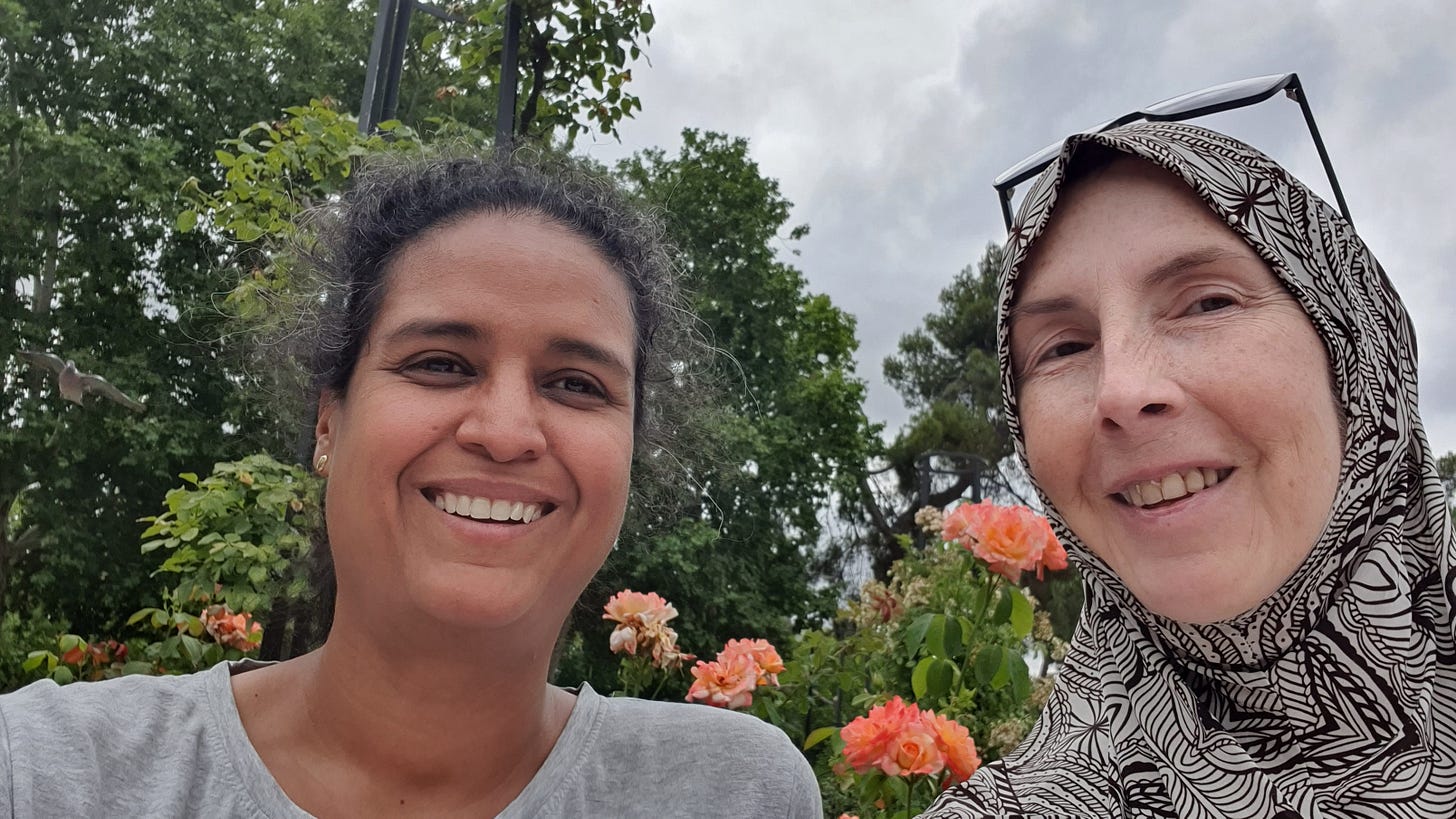
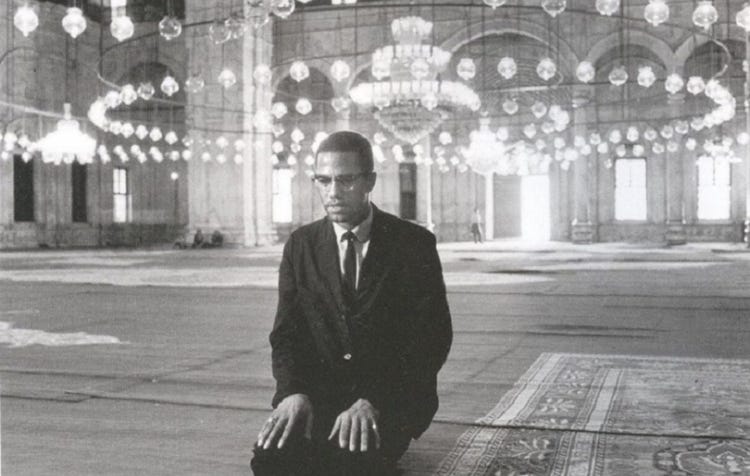

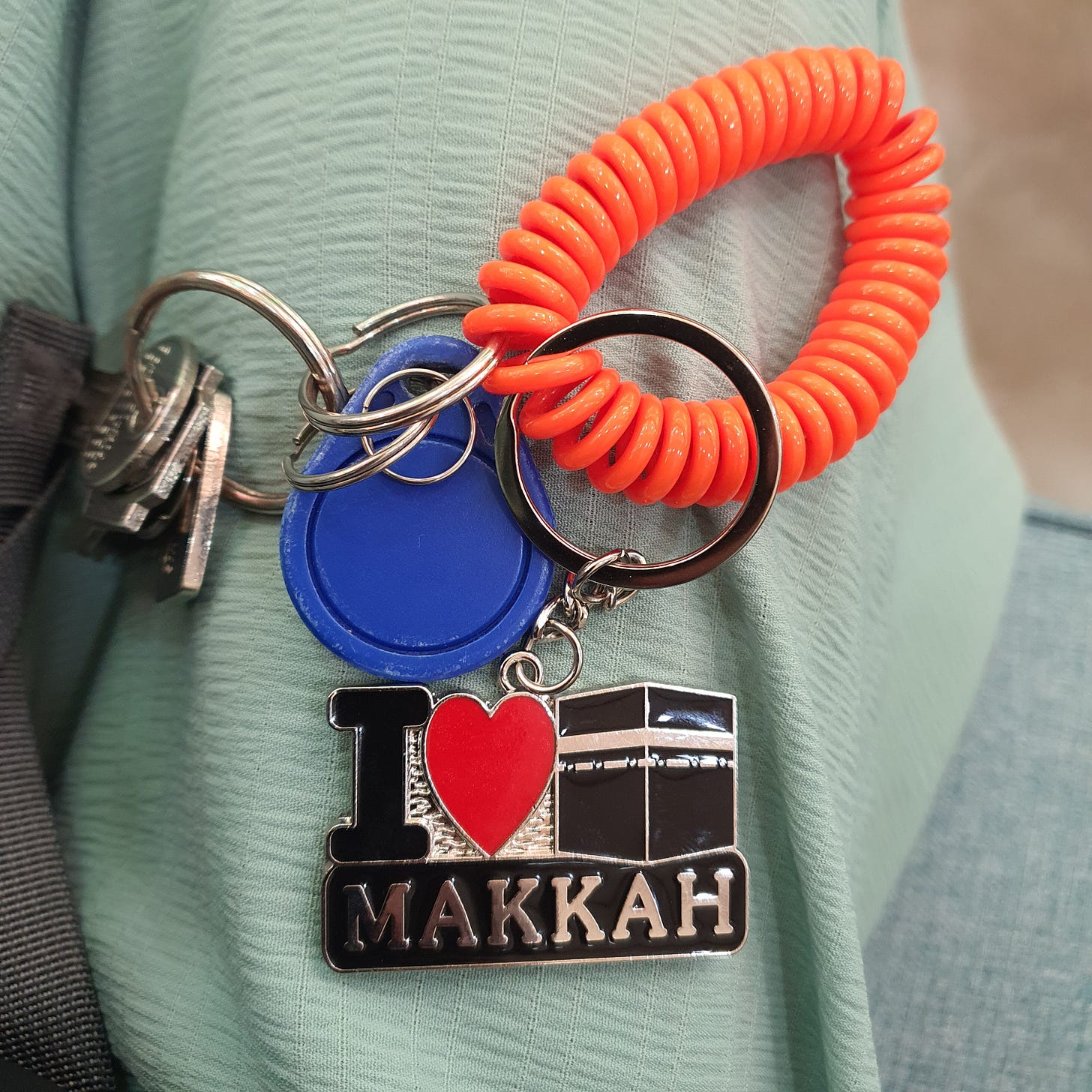

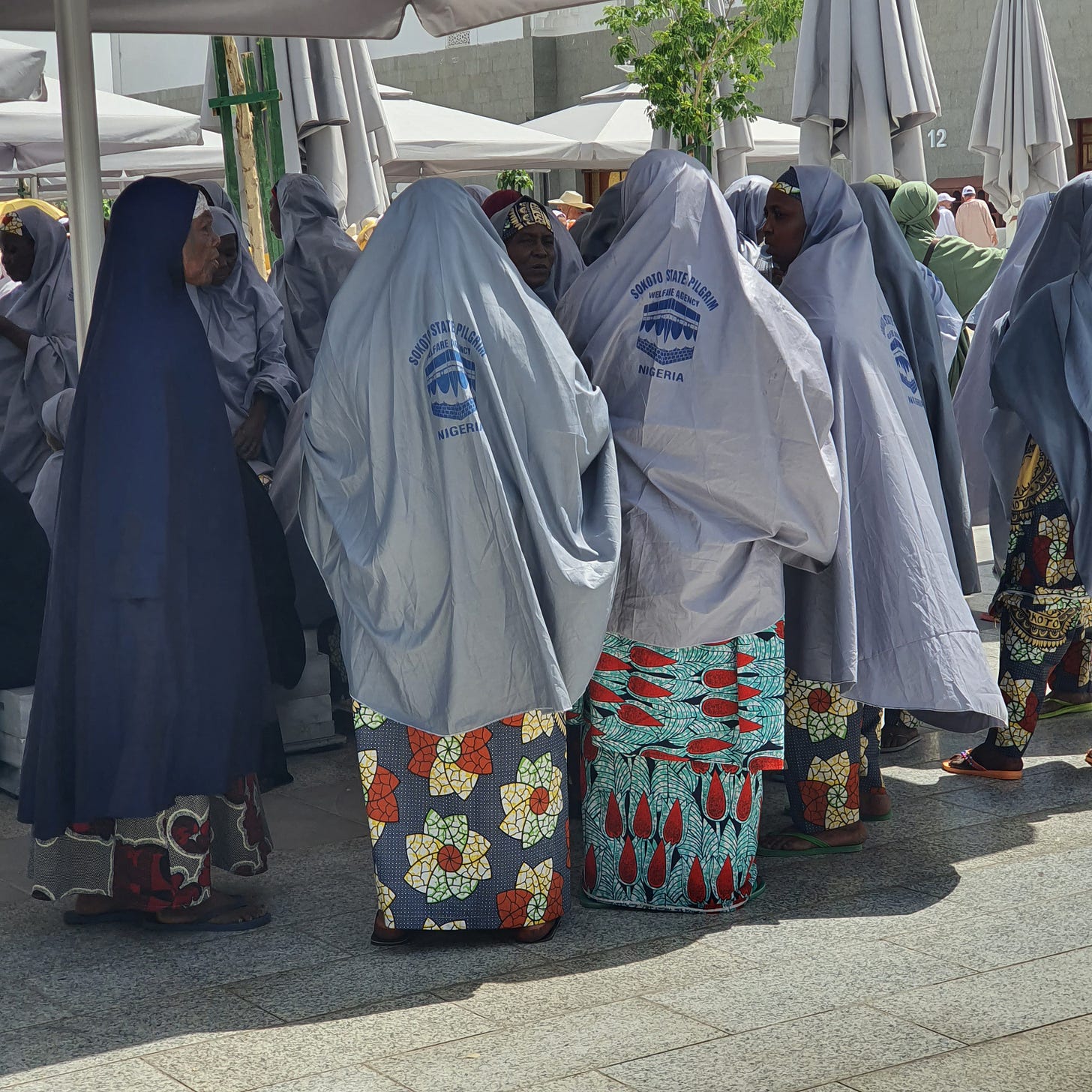
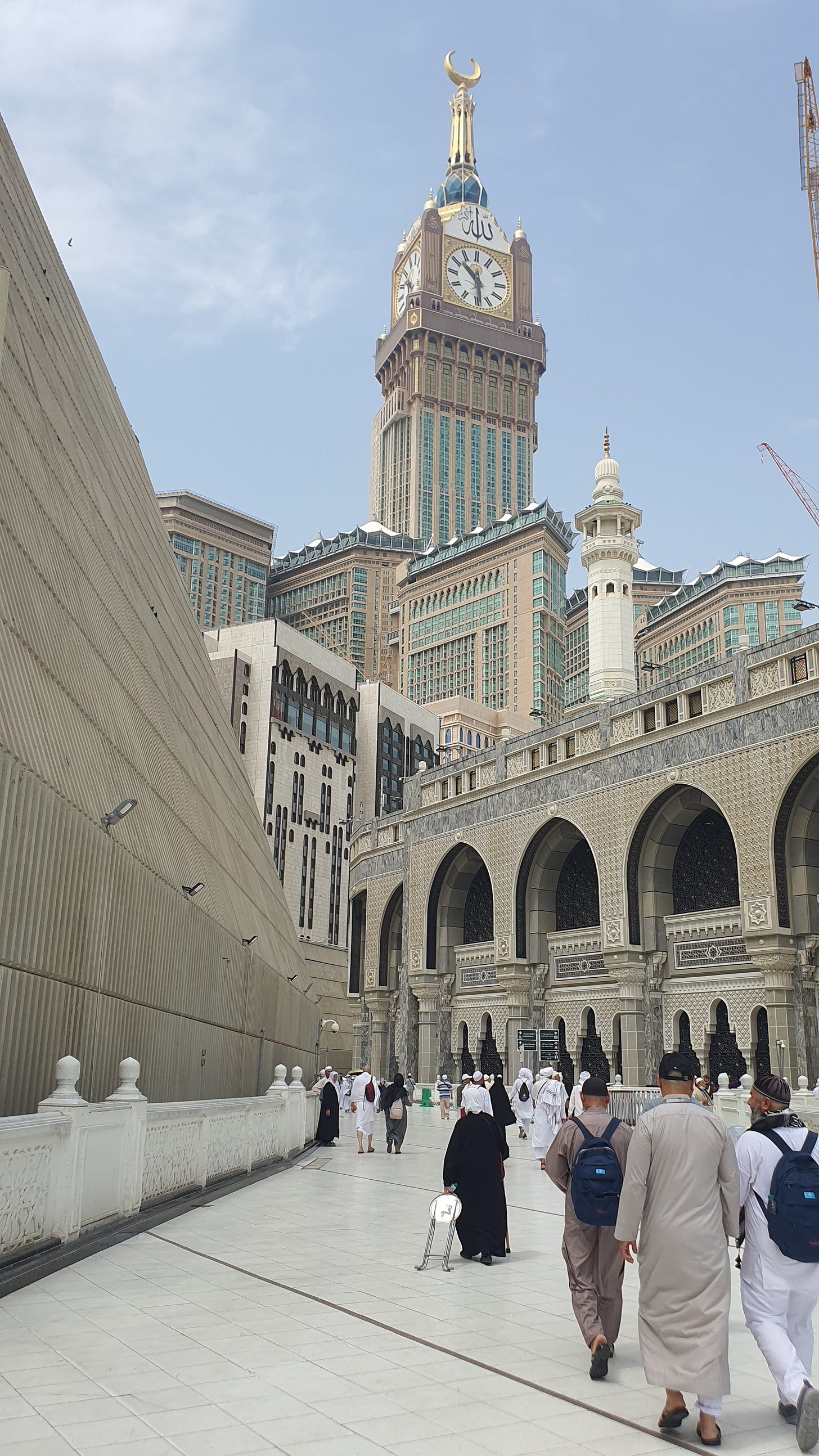
Salaam Sister, looking forward to reading more on this platform 🤲🏻
I’ve been waiting for your return, alhamdulillah you’re safe & sound! Hajj mabroor and may you experience even more delightful surprises in the months and years to come (no copay is a miracle)! I hung onto your every sentence, and I’m so grateful for your positive and bravely faithful decisions. Needed this eman boost. I’m sick this week and now my baby is too, but reading your story lifts my spirits and reminds me that Allah awaits; time to call. Rereading tomorrow and can’t wait for your next reflection iA. 💐